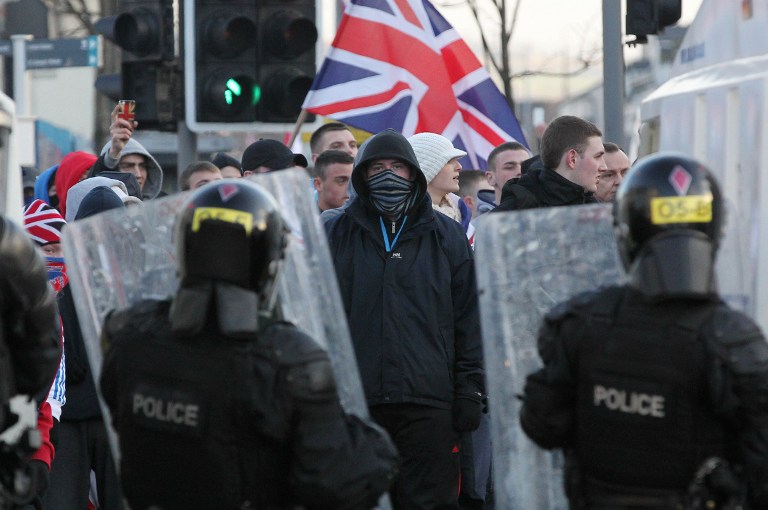SUMMARY
This is AI generated summarization, which may have errors. For context, always refer to the full article.

BELFAST, United Kingdom – The flag protests in Northern Ireland have exposed the deep sense of alienation felt by the staunchly pro-British Loyalist community, as the benefits of the peace process seemingly pass them by.
The unrest has also shown how symbolism remains a highly contentious issue in areas of Belfast where deprivation, unemployment and educational under-achievement have become entrenched.
The capital’s City Council — hung between Catholic Irish and Protestant British parties with the cross-community Alliance holding the balance of power — voted on December 3 to fly the British flag above the City Hall only on certain designated days. Until then, it had flown all-year round.
Since the vote, loyalists — the working-class hardcore of Northern Ireland’s Protestant unionists — have taken to the streets to protest and even riot, an explosion of anger that few predicted.
On Saturday, January 12 alone, 29 police officers were hurt in rioting.
At a small, daily demonstration outside the Alliance office in the loyalist heartland of east Belfast one local man, said loyalist concerns were simply not registering with politicians.
He wore the British flag round his shoulders as well as on the hat and scarf keeping out the January chill. He brandished a banner reading “Defend our flag”.
“It’s a step too far, so it is,” the 59-year-old, who did not want to be identified, told AFP.
“That flag was up for 106 years. It’s Britain. It should be up.
“It’s not on, they just take and take,” he said of the Irish nationalists now sharing power in Northern Ireland with unionist parties.
“It’s all right having peace and all, but not at any price.”
Dominic Bryan, director of the Institute of Irish Studies at Queen’s University Belfast, said the attachment to flags and emblems is heightened in ethnic disputes.
Unionist politicians had failed to prepare their electorate for the implications that power-sharing inevitably has for symbols such as the City Hall flag, he said.
“It seems madness to the outside world, but that is what people get deeply perturbed about,” he told AFP.
“Belfast has a history of being a broadly Protestant and unionist town. The population shift is now about 50-50.
“The (flag) agreement marked a political change. However, society in Northern Ireland has seen dramatic changes as well,” he explained.
“It’s de-industrialized. A lot of the jobs around the shipyard, which Protestants in east Belfast would have had have disappeared.
“The education system tends to fail working-class Protestants more than any other groups. There are some deep underlying issues in some of these areas that need to be addressed.”
Alarmed by the reaction, unionist politicians of all shades have convened a forum to begin addressing the discontent felt at the perceived “chipping away of Britishness”. It held its first meeting on Thursday at Stormont, seat of the Northern Ireland Assembly.
Northern Ireland’s regional development minister Danny Kennedy, a senior Ulster Unionist Party figure who was among the two dozen participants, said politicians needed to hit the streets to hear loyalist concerns first-hand.
“A section of the unionist Protestant population feel themselves isolated and alienated from the political process,” he told AFP.
“There’s a very strong sense within grass-roots loyalism that they haven’t seen the benefits. Not all of the boats in the rising tide of the peace dividend have risen to the extent that others have seen.
“They see that their Britishness… is being undermined and diminished by political opponents such as Sinn Fein.”
Sinn Fein, the main Irish nationalist party, feel unionist decision-makers have lost touch with their loyalist roots.
“There has been a complete failure of political leadership within unionism,” Jim McVeigh, their leader in the city council, told AFP.
“We have no desire to deny anyone’s Britishness but what we want is mutual equality and respect.
“This is a reasonable compromise; it isn’t the end of the world.”
But for the protesters outside the Alliance office, it is a bridge too far.
They feel loyalists have not benefited from the sacrifices made as part of the 1998 Good Friday peace accords that ushered in power-sharing.
“We got absolutely nothing out of it,” said the 59-year-old demonstrator with the banner.
“There’s nothing for the kids in the area. There’s no work for anybody.
“The nationalists, they get it all: they get new schools, new houses, they’ve got everything down there.
“We are definitely forgotten.
“The politicians don’t care no more. They’ve got what they want.” – Rappler.com
Add a comment
How does this make you feel?
There are no comments yet. Add your comment to start the conversation.